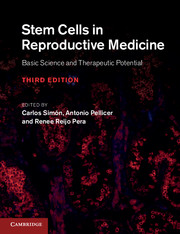Book contents
- Stem Cells in Reproductive Medicine
- Stem Cells in Reproductive Medicine
- Copyright page
- Contents
- List of contributors
- Preface
- Part 1 Female gamete
- Part 2 Male gamete
- Part 3 The embryo/blastomere
- Part 4 Trophoblast, amniotic fluid, endometrium, and bone marrow
- Part 5 New developments in stem-cell research
- 14 Dedifferentiation, transdifferentiation, and reprogramming
- 15 The metabolic framework of pluripotent stem cells and potential mechanisms of regulation
- Index
14 - Dedifferentiation, transdifferentiation, and reprogramming
from Part 5 - New developments in stem-cell research
Published online by Cambridge University Press: 05 July 2013
- Stem Cells in Reproductive Medicine
- Stem Cells in Reproductive Medicine
- Copyright page
- Contents
- List of contributors
- Preface
- Part 1 Female gamete
- Part 2 Male gamete
- Part 3 The embryo/blastomere
- Part 4 Trophoblast, amniotic fluid, endometrium, and bone marrow
- Part 5 New developments in stem-cell research
- 14 Dedifferentiation, transdifferentiation, and reprogramming
- 15 The metabolic framework of pluripotent stem cells and potential mechanisms of regulation
- Index
Summary
Keywords
- Type
- Chapter
- Information
- Stem Cells in Reproductive MedicineBasic Science and Therapeutic Potential, pp. 152 - 163Publisher: Cambridge University PressPrint publication year: 2013
- 1
- Cited by



